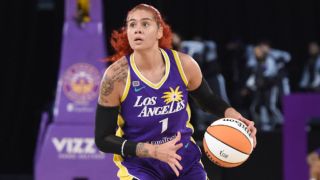Candace Parker of the Chicago Sky recently summed up the essence of one of the WNBA's longest-running subplots: getting caught in the standings logjam. It can happen in any sport, but with a relatively short season and a lot of parity with just 12 franchises, the WNBA frequently has a large group of teams with records, pluses and minuses that are all similar.
The WNBA, Parker said, "will have you thinking that you are the best thing ever. And then a game later, a losing streak, two or three go by, and you think you cannot ever win again.
"So you've got to stay even-keel. You have to understand that even when you win, there's so many things you've got to work on. And even when you lose, there's things you did well."
About a month into the season, the Seattle Storm (11-2), Las Vegas Aces (9-3) and Connecticut Sun (8-3) are at the top of the standings. The New York Liberty, in fourth place at 6-5, are also above .500. One team has separated itself at the bottom: the Indiana Fever (1-12).
The WNBA's other seven teams are at .500 or just below it. Going into a busy Thursday when 10 teams will be in action, our panel of writers -- ESPN.com's Kelly Cohen, Kevin Pelton and Mechelle Voepel, and The Undefeated's Sean Hurd -- dissect the logjam and how teams might be able to separate themselves going forward.
And it's worth noting: One or more of these teams could advance to the postseason with a losing record. In WNBA history, 38 teams with losing records have reached the playoffs, including a record five teams in 2014.

Atlanta Dream (5-6)
What's working: The Dream, one of two teams one game below .500 -- five games behind league-leader Seattle in the standings -- have one of the best offenses in the league. They average 83.5 PPG, which ranks fourth in the WNBA. At 101.1, they also have the fifth-best net offensive rating in the league. This years' best teams are offensive juggernauts, so having an offense that competes with Las Vegas and Seattle is quite possibly how you work yourself into the playoffs.
What needs work: Like most teams in the middle of the standings, the Dream must improve their consistency. They amassed a four-game winning streak ... then lost four in a row. That skid included two losses apiece against the Storm, the top team in the league, and the Minnesota Lynx (4-6), who are behind Atlanta in the standings. Getting Chennedy Carter (15.7 PPG) back could be the key. The second-year guard remains day-to-day and hasn't played since May 29 due to an elbow injury. -- Kelly Cohen

Chicago Sky (5-7)
What's working: The Sky are finally back on track after a seven-game losing streak and the return of Parker. They currently have no players out with injury after being hit hard by injury and absence early in the season. Chicago has won three consecutive games and has looked commanding, but now hosts Connecticut for two games that will show if the Sky are serious about being the playoff team we all thought they were at the beginning of the season.
The Sky are one of the best teams in the WNBA in rebounds per game (37.1), assists per game (19.7), steals per game (8.1) and blocks per game (4.6). Talk about well-rounded basketball.
What needs work: It seems silly to say, but the Sky just need to win. A seven-game losing streak is no fun to try to make up, especially when the other early favorites (the Aces and Storm) are putting together long winning streaks. If the season ended today, Chicago would fall short of a playoff berth.
Parker, who had a double-double in her second game back, needs to stay healthy. Point guard Courtney Vandersloot -- who just became the quickest player in WNBA history to reach 2,000 assists -- and Stefanie Dolson have been playing fantastic basketball as well. Getting those three, as well as Allie Quigley, back in sync will be how those games get won. -- Cohen

Dallas Wings (5-6)
What's working: Despite coming off an 85-78 loss at Las Vegas on Sunday, things seem to be looking up for the Wings. Before that, they had won four of five, with the only loss being 105-102 in overtime as the Storm's Jewell Loyd hit the game winner with less than a second left.
The Wings were 1-4 in May and are 4-2 in June. A big key in the early struggles was that forward Satou Sabally and guard Allisha Gray were competing in Olympic 3x3 qualifiers; Gray played in just one May game and Sabally none. Both have appeared in five Dallas games in June, with Sabally averaging 14.4 PPG and 7.0 RPG and Gray 10.0 and 4.2.
The Notre Dame connection has been the backbone for the Wings: Arike Ogunbowale (20.9 PPG) and Marina Mabrey (16.9 PPG). Dallas is fourth in the league in offensive rating (102.7) and net rating (2.2).
What needs work: It's not too surprising that a team led by Ogunbowale, who creates so many opportunities for herself, is 10th in assist percentage (58.8). But the Wings might want to see their offense become a little more collaborative.
The Wings are just about middle of the pack in defensive rating (100.5), and they tend to give up more fast break points and points in the paint than most teams. A little defensive improvement could be a big difference for Dallas. -- Mechelle Voepel


Los Angeles Sparks (5-5)
What's working: Defense has been the foundation of the Sparks' season, and it's one of the best in the league. As a team, Los Angeles allows the second-fewest points per game in the WNBA. Sparks players are sprinkled all over the league's defensive stat categories. Amanda Zahui B and Nia Coffey rank fourth and fifth in blocks, respectively. Brittney Sykes, who is one of the most fun players to watch on the defensive end, ranks 10th in steals. The team leads the league in forced turnovers per game (19.5).
Despite the absence of both Nneka and Chiney Ogwumike in the frontcourt, the Sparks have held together defensively.
What needs work: Defensive rebounding has been an issue for Los Angeles all season. The Sparks rank last in defensive rebounding percentage (64.2%) and allow the fourth-most second-chance points in the league (11.1).
But the real issue for Los Angeles has been on the offensive side of the ball, and losing the Ogwumikes -- who contribute a combined 25.4 PPG -- has made things harder. The team has the lowest points per game total in the league. Part of that could be ball movement. The Sparks rank last in the league in assists per game, with 45.0% of their made field goals being unassisted -- highest in the league.
It's clear that going forward the Sparks will need more out of their veteran leader Kristi Toliver, whose production has been below expectation this season. Toliver addressed the need to become a consistent scoring threat for the Sparks on Tuesday, adding that she's confident about her ability to eventually find her rhythm within Los Angeles' system. Toliver following that statement with a 17-point performance in a win against Phoenix on Wednesday is a great sign for the Sparks. -- Sean Hurd

Minnesota Lynx (4-6)
What's working: Sylvia Fowles has reestablished herself as one of the WNBA's top post players after an injury-marred 2020 campaign. At age 35, it wasn't clear Fowles would again be so dominant after the Lynx found success in the Wubble going small and putting five shooters on the court. However, Fowles has been a constant force with Napheesa Collier returning late from overseas and multiple other Minnesota players dealing with injuries. Fowles' 16.5 PPG would be her most since 2018, and she has done it on 63.5% shooting, the league's best mark among qualified players.
What needs work: Injuries to newcomers Natalie Achonwa (MCL sprain), first-round pick Rennia Davis (stress fracture, left foot) and Aerial Powers (a tear of the UCL ligament in her right thumb, requiring surgery) have left the Lynx woefully thin despite strong play from hardship signing Layshia Clarendon. Above and beyond that, Minnesota's shooting has been a surprising weakness. The Lynx finished third in 3-point percentage (38.5%) and fourth in total 3s (8.3 per game) last season and then added Kayla McBride in free agency. So it's shocking that Minnesota has slumped to 10th in the league in accuracy at 33.3%, with Collier and Damiris Dantas both going from 40%-plus in 2020 to sub-30% in 2021. -- Kevin Pelton

Phoenix Mercury (5-7)
What's working: Guard Skylar Diggins-Smith (19.0 PPG, 5.6 APG) and center Brittney Griner (20.1 PPG, 10.3 RPG) are both playing very well, and have started every game along with forward Brianna Turner and guard Kia Nurse. Before Wednesday's game vs. Los Angeles, Nurse talked about the Mercury's confidence not really wavering despite coming off a three-game losing streak. Unfortunately for Phoenix, the skid is now four games after Wednesday's 85-80 loss to the Sparks, despite 30 points and 10 rebounds from Griner.
What needs work: The absence of 39-year-old vet Diana Taurasi (she's out with a small fracture of the sternum) impacts the Mercury in terms of how their offense works and also in not having one of the game's all-time best when it comes to killer instinct.
At crunch time late on Wednesday, a couple of key plays from the even-more injury-riddled Sparks sunk the Mercury. Phoenix's bench hasn't provided a lot of help, although normal reserve Sophie Cunningham got her first start of the season and scored 16 points.
The Mercury are 10th in the league in 3-pointers made per game (6.2); their seven treys against the Sparks weren't enough. The Mercury seem to be playing almost as if they expect things to go wrong at game's end. -- Voepel

Washington Mystics (4-6)
What's working: For a team that lost its top offseason acquisition to a season-ending injury (Alysha Clark), has been hindered by short-term injuries (Natasha Cloud, Sydney Wiese) and is playing without a former WNBA MVP (Elena Delle Donne) and Finals MVP (Emma Meesseman), the Mystics have managed to maintain. It's clear that once Delle Donne begins play -- though coach Mike Thibault said Tuesday that could be as late as after the Olympic break -- this will be a different Mystics team.
With the exception of a 17-turnover performance against the Dream on Sunday, Washington generally does a good job of taking care of the ball. They average 12.7 turnovers per game, third fewest in the WNBA.
The Mystics also continue to be solid from beyond the arc, and 3-point shooting has always been a part of Washington's offensive identity. This year, the Mystics have taken it up a notch. They're averaging 27.7 3-point attempts and 9.4 makes per game on 33.9% accuracy. Three-point shots account for 34.6% of their offense, second behind New York. They should get an added boost from the return of Wiese, who was shooting 47.6% on 3s prior to an ankle injury that has kept her sidelined since May 28.
And we must give much-needed recognition to Mystics guard Ariel Atkins, who has had a tremendous season to date, averaging career highs with 18.0 PPG, 3.0 RPG and 2.9 APG. The fourth-year guard is also shooting a career-best 45.5% on 3-pointers and leads the league in 3-pointers made per game (3.0).
What needs work: Stronger bench production could help. It's a tough critique for a team that has been depth depleted since the start of the season. The Mystics have had two games in which they lost by five or fewer points. In a five-point loss to Connecticut on May 28, the bench scored just seven points. In a three-point loss to Las Vegas on June 5, the bench scored six. All those points were scored by a single player: Leilani Mitchell.
The Mystics' bench ranks third worst in points per game but has improved over the past two games. Theresa Plaisance has had back-to-back strong performances, same with Kiara Leslie. The team is looking for more out of Stella Johnson, as we saw what she is capable of last season in the bubble. -- Hurd
